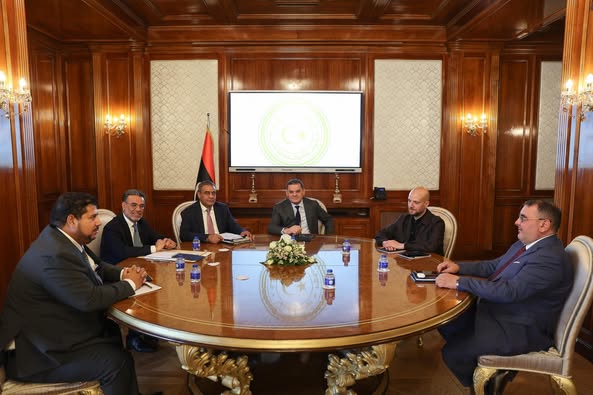Tripoli— “The maritime border issue is a sovereign issue that touches on the core of Libyan national security and cannot be addressed with a technical logic separate from the national political decision,” the head of the Government of National Unity (GNU) Abdulhamid Dbeibeh told a gathering of senior government officials on Tuesday.
According to a GNU statement, the meeting comes as a part of the government’s new approach “to take the initiative in all matters related to national sovereignty, both on land and at sea, and unifying Libya’s position in dealing with strategic issues that cannot be postponed or be a subject of dispute” among Libyans.
The meeting discussed the technical and legal aspects that are related to the demarcation of Libya’s maritime borders and assessed the political and regional challenges associated with Libya’s sovereign rights in these areas, particularly with regard to natural resources in exclusive economic zones.
Mr. Dbeibeh emphasized the need for Libyan authorities “to work in complete institutional harmony, combining technical precision, legal authority, and a clear sovereign decision.”
The Chairman of the Land and Maritime Borders Committee at the Ministry of Foreign Affairs Mr. Mohamed El-Harari presented during the meeting a comprehensive briefing on the current situation, the progress of the committee’s work, and the obstacles facing the completion of demarcation and control of maritime points.
He emphasized the importance of coordination between technical and sovereign authorities to ensure a firm Libyan position in the face of any future regional disputes or understandings.
On his part, the Chairman of the National Oil Corporation (NOC) Masoud Suleiman shed light on the repercussions of any legal or geographical disruption to offshore exploration and production activities. He stressed that there is always a need to obtain full legal authority and cover for concession areas in order to protect Libya’s resources from any external disputes and conflicts.
The meeting concluded on the note that it would be rather important for the country to establish a “technical sovereign body” whose task would focus on coordinating the related institutions’ work including: follow up the implementation of demarcation plans; strengthen Libya’s position on the regional maritime map, in accordance with the Law of the Sea and international agreements.
